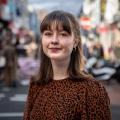
A Brighton graduate will make history when he blasts off on a space adventure.
Dr Sultan Al Neyadi will be the first Arab astronaut to take part in a long-duration space mission when he launches into orbit on February 26.
Dr Al Neyadi will be part of a Nasa/SpaceX crew bound for a six-month stay on the International Space Station.
He will take off on a Falcon 9 rocket from the Kennedy Space Centre in Florida.
The 41-year-old said he “felt ready and excited” for the launch.
“Just the idea of waking up every morning and having access to a window you can see and scan the whole world in 90 minutes is amazing,” he said during a recent NASA media briefing.
Dr Al Neyadi came to the UK to study for an undergraduate degree in electronics and communications engineering at the University of Brighton and graduated in 2004.
Further studies took him back to his native United Arab Emirates where he earned a master's degree in computer engineering, and later gained a doctorate in Australia.

Dr Al Neyadi’s big break came when he was selected as one of two people from 4,022 candidates to become the first Emirati astronauts, allowing him to enter the UAE astronaut programme at the Mohammed bin Rashid Space Centre in Dubai.
He has trained in Houston for the past three years, including a NASA course and mission-specific preparation.
Professor Debra Humphris, vice-chancellor of the University of Brighton, said: “This is a rare and wonderful achievement by Sultan, and one that reflects a huge amount of dedication and hard work.
“On behalf of everyone at the University of Brighton, we wish him the best of luck for his mission aboard the International Space Station.
"I’m incredibly proud to know that our university played an important role in his journey, and we look forward to hearing about his exploits when he returns."
Dr Al Neyadi is set to be involved in around 20 experiments during his time on the ISS, including experiments related to human physiology and robotics, as well as carbon dioxide removal from sealed habitats.
“It’s going to be a busy schedule in terms of science and doing all sorts of cool stuff,” he said.
“We are subjects ourselves and we’ll have a lot of sensors on us when we do experiments, when we go to sleep."
At his official Nasa press conference, Dr Al Neyadi also revealed that he will observe the holy month of Ramadan while in space.
The usual practice of fasting between sunrise and sunset will not be applicable in orbit around the Earth, but Dr Al Neyadi will have the status of being a traveller, which allows those fasting to avoid health risks while away from home.
So, while observing Ramadan, he will be allowed to eat sufficient food without jeopardising the mission.
The launch broadcast will begin on NASA TV at 3.30am on February 26 and will be on the agency’s website, as well as YouTube, Twitter, Facebook, LinkedIn, Twitch, Daily Motion, theta.tv, and Nasa’s app.



Comments: Our rules
We want our comments to be a lively and valuable part of our community - a place where readers can debate and engage with the most important local issues. The ability to comment on our stories is a privilege, not a right, however, and that privilege may be withdrawn if it is abused or misused.
Please report any comments that break our rules.
Read the rules hereLast Updated:
Report this comment Cancel